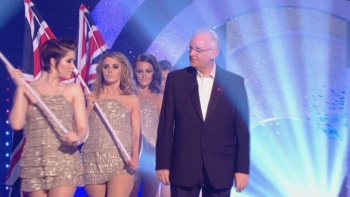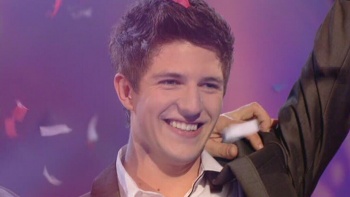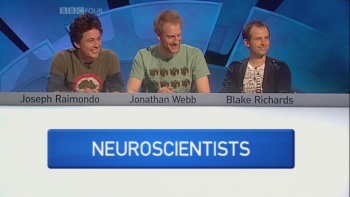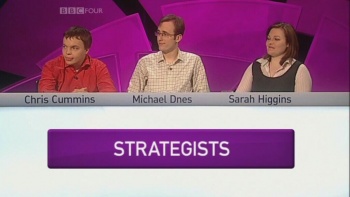Weaver's Week 2010-03-21
Last week | Weaver's Week Index | Next week
"A shambles" – Dr. Fox.
Contents |
Your Country Needs You
Amy MacDonald released a new album last week. Not only is she doing spectacularly well in her native Scotland, but she's rather popular elsewhere. She's big in Belgium, huge in Holland, ginormous in Germany, and so popular in Switzerland that she knocked the cuckoo clock off the top. Only the self-proclaimed tastemakers in London aren't impressed with the earnest guitar work. We have a suspicion that, if the BBC were to invite Miss MacDonald to perform a song from her new album at the Eurovision Song Contest, she would be guaranteed 30 to 40 points on name recognition alone.
Instead of an established performer, the BBC has decided to entrust their entry in the planet's biggest game show to someone entirely new. They've asked Mr. Pete Waterman, a railway buff from Coventry, to write the song, in association with his quondam colleague Mr. Mike Stock. These gentlemen formed two-thirds of Stock Aitken Waterman Productions, who had a squillion hit singles and albums in the late 80s and early 90s.
The show begins with our host for the night, Mr. Graham Norton, walking onto the stage. It looks as though it was meant to be the flag of Scotland, being a white cross painted onto a dark floor, but recent budget cuts have meant that the stage is only a quarter-built, and the cross runs out of paint just after the intersection. The host explains what's going to happen over the course of the evening. The host explains what's going to happen over the course of the evening, which includes reading the autocue without bothering to understand a word he's saying or spotting that he's said that bit not five seconds ago. Mr. Norton introduces Mr. Waterman, and his pap panel for tonight, Miss Jade Ewen of The Sugababes 2.7β, and Mr. Bruno Tonioli of Ballroom with Brucie. They will give completely anodyne and pointless reviews of the various performances, making them this format's Paula Abdul and (er) Bruno Tonioli.
Now, the problem with inviting Mr. Waterman to work with some unknown performers is that Mr. Waterman is a veteran of the pop industry. His greatest hits were mostly written and released between 1988 and 1991, and that's before many of the contestants were born. In the first part of the show, the contestants are invited to perform one of Mr. Waterman's very many hit singles. Some of the performances were reasonable, and we suspect Karen Harding's rendition of "What do I have to do" would win plaudits at many karaoke nights.
If only we could say the same for group Uni5, who admitted they had been thrown together for the purpose of this competition, hadn't had much time to rehearse together, and their rendition of "Last thing on my mind" was all over the place, with harmonies that weren't harmonious, singing that was flatter than a pancake, and fussing about with those hand-mikes. It was the worst thing we'd seen on BBC1 in days and days, and rightly slagged off by Mr. Waterman. The other group – Miss Fitz – contained Colin Berry's daughter, but they'd been rejected by Simon Cowell and by Andrew Lloyd Webber in the equivalent contest last year. They also performed a Steps number, "Better the devil you know", in a manner that had us pining for Sonia's song of the same name.
After 45 minutes of increasingly desperate karaoke, including a reprise of the Abba tribute medley from the 1999 BPI awards ceremony (c'way Belle and Sebastian!), we finally get to hear the BBC's entry. This should be a big thing, it's the BBC representing itself in the planet's greatest entertainment spectacle, and we're expecting something brilliant, something electrifying, we're expecting glitter to come out of the set.
Is that it? Is that it? Alexis Gerrard has the dubious honour of performing the song first, and his cheesy disco is the sort of thing Jason Donovan would have rejected as too naff, like putting lemon juice into one's hair to bring out the blond streaks. Esma Gillick might have had a different arrangement, and certainly one that's going to turn up in clip shows from here until kingdom come, as she misses her cue at the start of the second verse, and there's an awkward pause until she picks up the lyric.
That just about sums up the night. The much-vaunted BBC budget cuts have clearly found a home here, and what should have been a celebration of British talent has turned into the biggest failure of the year. The host fluffs his lines, the stage is dowdy, the audience look like they'd have a better time watching Peter the Duck being knitted. The whole job has been done in too much of a rush, corners have been cut, and it's showing on screen. There clearly hasn't been enough rehearsal time, there clearly hasn't been enough thought put in, there clearly hasn't been enough money spent on the show otherwise they'd be able to afford someone other than cheap casting show rejects. The result is probably the worst Friday night music show since the very first episode of Fame Academy.
What we're looking for in a good song for Eurovision is a good song. One that's well-crafted, well-constructed, and will be memorable after one listen. What Mr. Waterman and Mr. Stock have given the country is a Eurovision song, one that is all ding-a-dong-a-diggy-doogy-bingy-boingy-boing and no actual substance.
The public vote is won by Josh. He was the least bad singer of an entirely unexceptional song, one that will require a lot of work to turn into something even vaguely presentable. We're going to be backing BHT, the broadcaster for Bosnia and Herzegovina, on the grounds that something good will turn up from there, even though we've not heard it at all, because the broadcaster actually tries. Shoving out a "will this do?" programme, as the BBC did last week, invites us to answer in the negative.
University Challenge
Deci-final 10: Imperial London v Girton Cambridge
If it feels like we've been seeing the same eight sides all year, there's a very good reason. We have been seeing the same eight sides all year. Imperial, for instance, have beaten Edinburgh and lost to Emmanuel Cambridge, while Girton have lost to St John's Oxford and beaten St Andrews. Surely there's a better way to find reduce eight sides to four.
Anyway, the first starter is a "starter" for ten, and Imperial do well on that, amber, initials, lost things, and X. Sorry, and eggs. Various kings called Alexander II give Imperial a further boost, and things to do with the number 101 are worth 1010 points (binary). The visual bonuses are Name That War from propaganda pictures, no-one gets the starter, and Imperial's lead is a stonking 70-0.
Girton get off the mark with the next starter, but the only war they can identify from its poster is Vietnam. Side on! But not for long – Imperial pick up lots of starters, and most of their bonuses, while Girton's next set of bonuses is on saints who were able to carry their own decapitated heads. Don't try this at home, kids. Which brings us to the Question That Thumper Only Reads Out And Doesn't Even Claim To Understand of the week:
- Q: A radio wave travelling through a dielectric has a wavelength of 15% of a kilometre and a frequency of 1 megahertz. What is the index of refraction of the dielectric?
Two. Obviously. Honestly, how could anyone not know that? Imperial do, and that helps to extend their lead to 125-20 by the time the host advises Girton not to give up, there's still plenty of time to go.
And the audio round, where no-one knows their Gershwin, or many other 20th century American composers. After a long series of dropped starters – we've gone from one to seven in no time at all – Imperial get a question about physics for their physicist. Will they hit a purple patch? Er, no, the definition eludes them in a series about the colour. Girton are asked about World Heritage Sites in south-east Asia, but it's never where they expect them to be. The second visual round is on depictions of scenes from long narrative poems, it's another dropped starter, and Imperial's lead is 135-45.
Girton pull back with the bonuses, and suddenly they're only 65 adrift, and almost within striking distance. But not quite, and Imperial get the next starter, though not the bonuses about simple machines. Girton prove that it's always useful to have watched Only Connect lately, as there's a question giving various definitions of the Third Man. Their knowledge of Canadian geography is good, and a Very Simple Only Connect sequence follows: 1901, 1910, 1936, 1936 is completed by 1952. Coronations was a series one question for the Greek letters.
Notations in ballet are the winning move for Imperial, it pushes their lead past 50 with only a couple of minutes to play. The question about Algeria being the second-largest country in Africa was asked under a different guise earlier in this series, when it was the largest on the Med. Not that any of this matters, or is even a bad thing, because Imperial run out 200-100 winners. Gilad Amit's five starters led them to the victory, the side made 17/33 bonuses and had a missignal. Two incorrect buzzes and 8/21 for Girton, for whom Daniel Spencer's three starters and no errors was best. The overall accuracy: 44/83.
Next match: St John's Oxford v tonight's winner
Only Connect
Quarter-Final 3: Neuroscientists v Strategists.
On with television's toughest quiz, the only show to make all its viewers feel like an idiot. We'll meet the Neuroscientists, for whom an average day seems to involve drinking lots of coffee, sticking electrodes into brains, and producing some bangin' rave tunes on the side. One of the Strategists wrote a dissertation on motorways that never got built, and another is a board game fan.
The Strategists won the toss and elected to defer, so the Neuroscientists kick off with something they believe to be six, but isn't. The Mean Machine was (of course!) Dick Dastardly's car in The Wacky Races. Drat and double-zero-points-drat! The Strategists take a gamble on Thunderbirds for two points, but not when Thomas the Tank-Engine appears. Six wheels, no points. Neuroscientists get K D Lang and Bell Hooks, and offer the suggestion that they're all gay. "We wouldn't make that assumption about our clues. We don't care if they're gay or not!" Goodness, Victoria really does chew them out; the strategists get the bonus point. And, in a Surprise Transmission Coincidence of the week, there's a k d lang concert going out at about 4am tonight.
Picture clue for the Strategists, but they're as confused as we are. Neuroscientists get that the figure in the first picture is Psyche, but no-one knows their odes by Keates. Neuroscientists have the audio round, but buzz for the sake of buzzing. Strategists get a colour from the final two clues, but it's wrong. Their own question is trivial and frivolous and banned under Cromwell in an effort to remove Catholic practices from the Church of England. Never mind Fibbonaci scores, this is a binary scoring game: Strategists lead 1-0.
So, into round two, where teams can literally explode their scores. Neuroscientists are right with the BASE jumping expansion, but can't recall that the E is Earth. Strategists have battlefields, perhaps in the civil war, and think St Albans comes next. Neuroscientists think they're railway stations. They were battles, but in the Wars of the Roses. Numbers that start and end with the same letter give the Neuroscientists a pair of points, opening their account.
Strategists get the picture clues, and the Hidden Transmission Indicator – St Patrick. That's got nothing to do with the orders of chivalry they're actually looking for. Neuroscientists reckon that their last sequence is on computing designs, but it's not, it's the internet (or wires), as being circles on the back of a two pound coin. Ranks in the mafia are the final link. Useless bonus information time! The consigliere (not featured in the question) is the advisor to the Don, always giving sage advice and intelligent comment and knowing really rather a lot.
The consigliere for the Greek letters tells us the score: 5-2 to the Strategists. They're able to extend the lead with the grid, and begin by thinking about poets laureate, but quickly pick up some laws, and then state capitals from the US. Welsh female vocalists and people whose name begins with "Beau" fall into place quickly, and that's a very very swift resolution. Ten Points!
Neuroscientists have to follow that. They're muttering about Mr men, distributions, types of ball in baseball – and that last one's the first they try, and are correct. We reckon there are some theorems in there (what else could Four Colour be?) and the team spends a little time going after those. They also have a shot at cheeses, but the grid freezes with just one group found. Yes, people were screaming at the screen, our non-resident cat got quite distracted from her Accumulatower building. Types of sole is the missing group. Four points!
Going into Ms Sngvls, Strategists lead by 15-6. And they've got a Countdown star on their team. Councils in Scotland go to the Strategists by 3-0, but surely everyone knows Angus. Nobel literature laureates from North America is with the Strategists by 2-1, and English words derived from Arabic goes to the Neuroscientists by 3-1. The Strategists get the only alloy on offer, to cement their win by 22-10.
The host suggests it was a really hard episode. She's not wrong there. And that the viewers need more sleep. On average, she's right.
Next match: Gamblers v Bowlers
Mastermind
Heat 22
Something of an artistic bent to Mastermind this week, with three broadly creative subjects, and one politician.
Iain Crawford kicks off with the politician, nominating the Life and Times of Robert Peel (1788-1850). The MP for Tamworth, Peel was Minister for Ireland at the age of 22, and Home Secretary while still only 34. He had a populist law and order agenda, and established a government-backed peacekeeper group for London, the "Metropolitan Police". His Tamworth Manifesto (1834) has been seen as the point where modern Conservatism differed from Tory policies – he advocated moderate reform of existing systems, and only where necessary. He was Prime Minister for a short period in 1834-5, and again from 1841-6, losing office after a backbench revolt on a tax against imported corn. The contender is very mobile in the chair, craning his neck as though he's being blinded by the spotlights, eventually settling into what seems like a most uncomfortable position. Still, it's successful, ending on 12 (1).
Diana Muir is going to tell us about Gertrude Jekyll (1843-1932). She was a landscape gardener, who often worked with Edwin Lutyens. Her style evolved into a cottage garden, a mixture of wild and formal, with borders encroaching on the lawns and paths. Her surname is pronounced GEE-kell, which may have been the original intention of Stevenson. It's a well-tended round, the odd weed here and there might add to the effect. 13 (2).
David Sutherland discusses the Child Ballads (1882-98). "The English and Scottish Popular Ballads" was a five-volume work by Francis James Child, and used the definition of "ballad" as a song telling a particular story. His aim was to make a comprehensive survey of stories told by song at the time, a task surely beyond any man. The contender gives another comprehensive overview, though total perfection does elude him: 14 (2).
Jim Murdock is our last contender, with the Life and Work of Baudelaire (1821-67). Charles Baudelaire is best known for his French-language poetry, including the collection "Les Fleurs du mal", which combines the twin themes of aesthetic beauty and urban decay. While a young man, Baudelaire participated in the 1848 anti-royalist revolt, and wrote art criticism. Later, he would translate Poe and won praise from Victor Hugo. A few long pauses in there, enough to see the contender end on 10 (3).
The top six runners-up:
- John Cooper 29 (3)
- Ian Scott Massie 26 (2)
- Les Morrell 26 (3)
- Colin Wilson 25 (0)
- Peter Cowan 25 (2)
- William de Ath 25 (4)
Mr. Murdock is straight back in the chair, and his general knowledge round is as much miss as hit, ending on 19 (7). Iain Crawford begins his tilt with three correct answers, hits a rocky patch, but gets the chess-player and politician Garry Kasparov, and the pop singer and politician John Lennon, ending on 22 (4).
Diana Muir goes bang bang bang through the questions, picking out Lady Chatterley's Lover, the Green Party, and tantalising. There's a little luck, and a little ill luck as baseball teams are asked to play American football. They'd still do better than East Michigan. As did this contender, a very good 23 (3).
So, David Sutherland needs ten to win, and there will be no change to the repechage board. We're impressed that he remembers the Q-ships, decoys used to deceive the enemy; the contender also works out Cuba from a sketchy set of hints. The winning post heaves into sight, and the contender passes it, then loses steam, finishing on 24 (6).
This Week And Next
The RTS awards took place this week. The Daytime category was always going to be won by a game show, and Come Dine with Me emerged on top. Dating in the Dark confounded expectations by winning the Multi-channel programme award, Antan Dec lost the Entertainment Performance to Harry Hill, but most attention was on the Entertainment Programme award. Would it go to Simon Cowell Presents Britain's Got Talent? No. Would it go to Simon Cowell Presents The X Factor (Apart From the Twenty Percent that's Presented by Simon Fuller)? No. The winner was Charlie Brooker's Newswipe, and the message from the RTS to Mr. Cowell is clear: now go away.
The week to 7 March saw Dancing on Ice retain its top spot (8.75m viewers), with Let's Dance for Sport Relief (7.2m) beating the second week of Push the Button (6.35m). Who Dares Wins returned with 6.05m. University Challenge topped BBC2's ratings at just under 3.5m, Come Dine With Me had 2.85m, Priceless Antiques Roadshow had 2.2m in its 6.30 spot. Come Dine With Me was by far the biggest game show on digital channels, 1.265m viewers is a year's best. Other shows struggled to get half as many viewers – QI XL had 565,000, Pop Idleus and Hell's Kitchenus just over half a million, and America's Next Top Model 440,000. Just behind those was Only Connect, bamboozling 430,000 viewers.
Coming up this week is Auction Party (ITV, 3pm weekdays), combining auctions with antiques. That's never been done before. Counterpoint (Radio 4, 1.30 Monday) returns, as does Ballroom with the B-List (UKTV Watch, 9pm Friday). David Mitchell completely loses control of his panel in The Bubble (BBC2, 11.25 Wednesday (11.55 in NI)). The new talent-spotting show Over the Rainbow kicks off (BBC1, 9pm Friday and 6.30 Saturday), and Celebrity Restaurant In Your Living Room (Living, 9pm Wednesday) does what it says on the tin. And Banzai is back (4Music, 9.15 Sunday).
To have Weaver's Week emailed to you on publication day, receive our exclusive TV roundup of the game shows in the week ahead, and chat to other ukgameshows.com readers, sign up to our Yahoo! Group.







